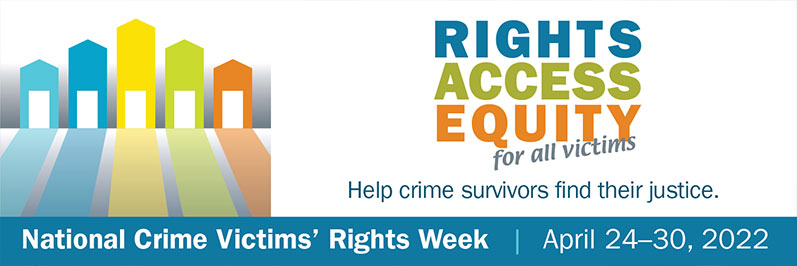National Crime Victims' Rights Week 2022

Office for Victims of Crime (OVC) Responds to Hate Crimes
By Kristina Rose, Director of OVC
The last week of April is National Crime Victims’ Rights Week, a time when we recognize the efforts of dedicated professionals and volunteers who support crime victims throughout the nation. It is also a time to reflect on our efforts to ensure that all victims, including victims of hate crimes, have access to the information they need, and to trauma-informed, victim-centered services.
According to the Federal Bureau of Investigation, the number of hate crime incidents reported in 2020 rose to their highest levels in nearly two decades. The FBI also reported that:
- Over 60% of those crimes were motivated by race, ethnicity, and ancestry.
- Hate crimes targeting people of Asian descent increased by 77% since 2019.
- Over 30% of hate crimes were motivated by the victim’s gender identity.
- Acts of hate targeting houses of worship and religious communities have also increased.
All victims of crime deserve to feel safe and supported. Attorney General Garland said it best:
“No one in this country should have to fear the threat of hate-fueled violence. No one should fear being attacked or threatened because of what they look like, where they are from, whom they love, or how they worship.”
To that end, OVC funds numerous programs aimed at restoring a sense of security, support, and well-being for those who have experienced trauma fueled by hate crimes.
For example, OVC’s Antiterrorism and Emergency Assistance Program (AEAP) supports victims and jurisdictions that have experienced large-scale incidents of terrorism or mass violence. Through the AEAP, OVC awarded more than $17 million following hate crime motivated shootings (e.g., the 2012 Sikh temple shooting in Oak Creek, Wisconsin; the 2015 African Methodist Episcopal church shooting in Charleston, South Carolina; the 2016 Pulse Nightclub shooting in Orlando, Florida; and the 2018 Tree of Life Synagogue shooting in Pittsburgh, Pennsylvania).
In addition, last October, OVC awarded $2 million to Futures Without Violence to partner with community-based organizations throughout the country to implement field-generated, culturally responsive projects to address hate crimes in underserved communities. Ultimately, the project will yield replicable models to combat hate crimes in other communities.
Crime victims and survivors need ready access to programs that can help them cope, both physically and emotionally, in the aftermath of hate crime. Victim service providers, funded through OVC’s Victims of Crime Act state formula grant programs, reported assisting an average of 19,000 victims of hate crimes during fiscal years 2019−2021, and state compensation programs paid 1,252 reimbursement claims for out-of-pocket expenses associated with hate crime victimizations (e.g., medical services, transportation, and funeral costs).
Through its grant programs, OVC, working in partnership with its federal, state, tribal, and local partners, is striving to make a difference in the lives of those impacted by crimes fueled by hate by strengthening the capacity of the victim services field to better serve and support these victims and collectively developing strategies and models for full recovery and healing.
If you are an organization that integrates trauma-informed and victim-centered approaches to supporting crime victims in its work, please visit our website to learn more about current funding opportunities.
Additional Resources
Hate Crimes Topic Page
Hate Crime Victimization, 2005-2019
Victim Impact Listen and Learn Curriculum

